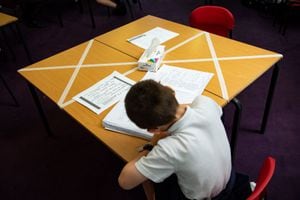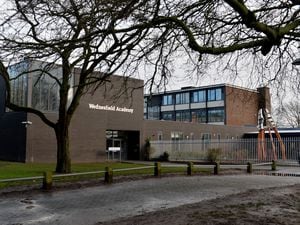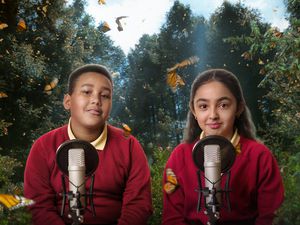Children's communication skills affected by lockdown, study shows
Talking and interacting with others is a vital part of a young child's development.

But there is growing evidence that lockdown, and the subsequent withdrawal of children from social settings, has had a profound impact on some.
Young children have had their communication skills significantly affected by coronavirus and lockdown restrictions, new research has suggested.
A study by The Education Endowment Foundation (EEF) was carried out across 58 schools in England to examine the impact of the virus.
And almost all schools – at 96 per cent – reported that children in Reception were struggling with communication and language development.
Restrictions have meant children in the year group, aged between four and five, have had limited contact with family members, friends and others.
The EEF showed nine in 10 schools raised concerns over the personal, social and emotional development of a child and a similar figure for literacy. And three-quarters of schools reported children who started school in autumn last year needed more support than in previous years.
More than half of parents were said to be concerned about their children starting school after lockdown, with a third expressing concerns about their child social and emotional development.
The study said: "The main areas of need highlighted by both parents and teachers are socio-emotional wellbeing and language and communication. These areas are key to children’s longer-term development and attainment.
"There has been an ongoing concern about children’s language development particularly in areas of disadvantage. Our findings reflect teacher perceptions as reported by Ofsted which suggest that children in the early years have lower language skills than expected.
"We know that language is vital for children’s literacy development. However, language is also vital for children’s socio-emotional development and behaviour.
"It would appear that the pandemic has exacerbated existing issues in oral language development, and this will need to be a key focus for any education recovery plans."
Niamh, a child in Reception at Ryders Hayes Primary School, in Walsall, is slowly building her confidence with words.
Like many children, her life has been limited by the pandemic, her social circle shrinking to her immediate family. And this left her mother, Lisa, anxious about her starting school.
Speaking to the BBC, she said: "She was one of the youngest in the year and it worried me that other children had got more school experience with nursery or pre-school.
"We tried to prepare her as well as we could. She was looking forward to it – but she didn't know any of the children in the class, so we were a bit worried about that.
"My concern was, after being locked down all of the summer and not going out to play with her friends, how was she going to respond to a room full of new children and new teachers?"
But the school's approach to take into account the impact of lockdown on pupils had worked well. "We never had a tearful morning – we never had a day where she didn't want to come to school," Lisa said.
The school's headteacher Saly Miner said problems with communication were "really limiting" for young children, particularly if they were unable to express themselves, interact with peers and make themselves understood.
"It's absolutely key," she said. "It's all about a child's self-esteem and confidence.
"And without that, they're not going to feel happy, they're not going to be able to grow, they're not going to be able to gain all the benefits of interacting with their peers as we'd want them to, and interact with staff."
Pat McFadden, MP for Wolverhampton South East, said he was concerned that a whole generation of children were being put at a disadvantage in life.
He said: "This report confirms the harm done to many children from losing out on so much education over the past year and from all the social interaction with other children that they have missed.
"Aside from fighting the virus itself, helping children recover from this is one of the great challenges of our times. It would be a terrible tragedy to have a generation of young children whose education and life chances were set back by what has happened over the past year.
"That’s why this should be a top priority for Government. We owe it to children to do everything we can to make up for what they have lost."
EEF chief executive Prof Becky Francis said there was "huge concern expressed by schools about young children's speech and language following the impact of the pandemic".
She said: "We can see that in the survey results but also anecdotally right across our networks."
The EEF's findings are also reflected in data from the company Speech Link, which offers standardised assessments to primary schools.
Among 50,000 four- and five-year-olds starting school in September, an extra 20-25 per cent needed help with language skills compared with the previous year, the company found. There are also concerns about the impact of the pandemic on pre-school children.
In some parts of England, up to 63 per cent of health visitors, who check on the development of babies and toddlers, had been redeployed early in the pandemic, the Institute of Health Visiting said.
Many families had missed out on face-to-face assessments, acting executive director Alison Morton said.
"We know there are children out there with difficulties who haven't been identified," she said. "There hasn't been a 'build back better' for younger children in the way there has been for older children."





